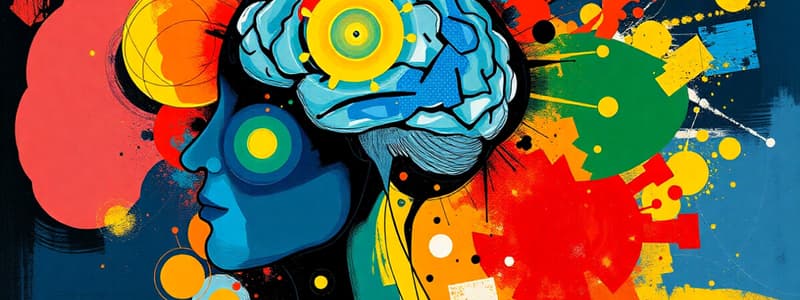Podcast
Questions and Answers
What distinguishes a phenomenon from a theory in psychology?
What distinguishes a phenomenon from a theory in psychology?
- A phenomenon is an established result observed reliably, while a theory offers coherent explanations. (correct)
- A phenomenon is always linked to psychological disorders, while a theory applies to general behavior.
- A phenomenon provides systematic explanations, while a theory is merely an observed result.
- A phenomenon requires direct observation, whereas a theory is based solely on assumptions.
What best exemplifies the Placebo Effect?
What best exemplifies the Placebo Effect?
- Experiencing benefits from treatment despite receiving no active ingredient. (correct)
- Feeling unwell because of expecting side effects from a drug.
- Gaining insights from therapy without the therapist's guidance.
- A significant improvement in symptoms due to actual medication.
How does Zajonc’s Drive Theory explain task performance?
How does Zajonc’s Drive Theory explain task performance?
- High arousal enhances performance on all types of tasks.
- Low arousal improves performance on hard tasks, while high arousal aids easy tasks. (correct)
- Task difficulty is irrelevant to performance outcomes.
- Individuals perform equally on all tasks regardless of arousal levels.
What is the primary purpose of a theory in psychology?
What is the primary purpose of a theory in psychology?
What is a key characteristic of a model in psychology?
What is a key characteristic of a model in psychology?
What is an example of a formal psychological theory?
What is an example of a formal psychological theory?
Which type of theory explains a wide range of behaviors?
Which type of theory explains a wide range of behaviors?
Which of the following is a function of a functional theory?
Which of the following is a function of a functional theory?
Which theory is typically more precise and uses concrete equations?
Which theory is typically more precise and uses concrete equations?
What is an example of stage theory?
What is an example of stage theory?
What limitation is inherent in theories considering complex phenomena such as human behavior?
What limitation is inherent in theories considering complex phenomena such as human behavior?
In which dimension do theories vary by how detailed their components are expressed?
In which dimension do theories vary by how detailed their components are expressed?
What type of theory organizes psychological phenomena into distinct categories?
What type of theory organizes psychological phenomena into distinct categories?
Flashcards are hidden until you start studying
Study Notes
Phenomena and Theories
- Phenomena is a reliably observed and replicated finding in systematic empirical research.
- Examples include the McGurk Effect and Placebo Effect.
- Theories are explanations or interpretations of phenomena using unobserved variables, structures, processes, functions, and principles.
- Example: Zajonc's Drive Theory explains how arousal affects performance on tasks.
- Perspectives are broader approaches than theories, such as explaining depression from a biological perspective.
- Models provide precise explanations using components like equations and biological structures.
- Example: Baddeley & Hitch Model of Working Memory.
Purpose of a Theory
- Organization: Theories provide structure and clarity for interpreting phenomena, with Occam's razor emphasizing parsimony.
- Predictions: Theories generate hypotheses, which are predictions about new phenomena.
- Example: Linnaeus's classification led to Darwin's natural selection, Mendel's mutations, and Watson & Crick's DNA discovery.
- New Research: Theories are tested and refined through research, leading to either support, revision, or refutation.
- Example: Cognitive Behavioral Therapy (CBT) constantly evolves through research.
Using Multiple Theories
- Human behavior is complex, requiring multiple theories to explain fully.
- Example: Parent-child attachment requires considering psychodynamic, evolutionary, and behavioral theories.
- No single theory can explain everything.
Dimensions in which Theories Vary
- Formality: Refers to the level of detail in theory components.
- Formal Theories: Precise variables and equations, prevalent in fields like mathematics and physics.
- Example: Kahneman & Tversky's theory in behavioral economics is one of psychology's few formal theories.
- Informal Theories: Simpler descriptions of relationships and concepts.
- Scope: Represents the range of phenomena a theory can explain.
- Broad Theories: Can explain a wide range of behaviors and phenomena.
- Example: Psychodynamic Theory.
- Narrow Theories: Explain a limited range of closely related concepts.
- Example: Intersensory-Redundancy Theory.
- Theoretical Approach: The types of concepts a theory aims to explain.
- Functional Theories: Explain the purpose or function of a phenomenon.
- Example: Theory of Evolution explains survival and reproduction.
- Mechanistic Theories: Explain processes and interactions of variables.
- Example: A theory of depression explaining serotonin interactions.
- Stage Theories: Explain phenomena by tracing its progression through stages.
- Example: Maslow's Hierarchy of Needs.
- Typology Theories: Organize phenomena into distinct categories.
- Example: Ectomorph, mesomorph, endomorph theories; Intelligence theories; Personality theories.
Studying That Suits You
Use AI to generate personalized quizzes and flashcards to suit your learning preferences.




